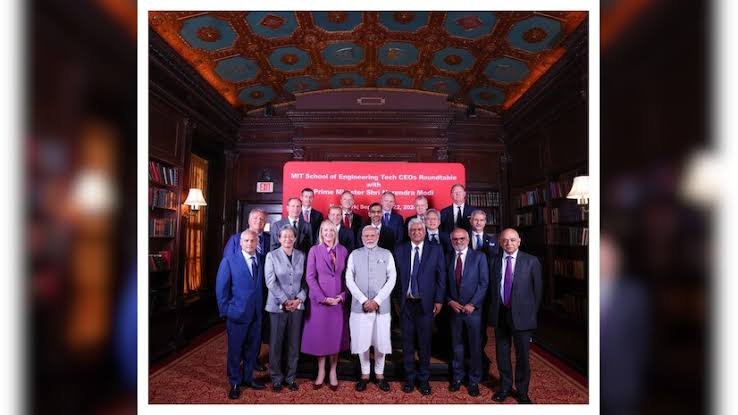Introduction: Tech Leadership Visionary Meet
Prime Minister Narendra Modi’s New York roundtable discussion with 15 tech CEOs was a major step in India’s digital transformation. The MIT School of Engineering hosted the event, demonstrating India’s expanding importance in AI, quantum computing, biotechnology, and semiconductor technologies. This high-profile meeting with Google, Nvidia, and Adobe showed the importance of India-US collaboration for technical innovation and economic success.
Why This Meeting Matters
The names of the corporations and the topics discussed make this event significant. By focusing on future-defining technology, PM Modi and the participating CEOs highlighted that the success of modern economies will mostly depend on innovation, adaptation, and cross-border collaboration. Furthermore, India’s continuing digital transformation, fostered by programs like Digital India and Startup India, places the country as a fertile ground for technological breakthroughs and international alliances.
The Meeting: A Hub for Future Innovation
The roundtable brought together tech luminaries from a number of industries, with the involvement of Sundar Pichai from Google, Jensen Huang from Nvidia, and Shantanu Narayen from Adobe, among others. This varied collection of leaders represents firms at the forefront of AI, quantum computing, biotechnology, and semiconductors—sectors that are likely to drive the next wave of technological disruption.
The seminar explored numerous major themes, including the ethical use of artificial intelligence, the future of semiconductor production, biotechnology developments, and the expanding significance of quantum computing in tackling complicated problems. Each CEO got the opportunity to provide insights on their various businesses and highlight how their companies are contributing to technical breakthroughs globally, as well as in India.
Key Topics Discussed:
1. Artificial Intelligence (AI): Ethical and Responsible Use
– PM Modi underscored India’s commitment to AI, underlining the government’s “AI for All” strategy. The Indian government intends to ensure that AI helps every part of society while maintaining ethical norms for its development and application.
– Google’s Sundar Pichai emphasized the growing importance of AI in solving real-world challenges, from healthcare to climate change. He stressed the necessity for continuing engagement between governments and the corporate sector to ensure that AI is developed ethically and inclusively.
2. Semiconductor Manufacturing: A Crucial Frontier
– With semiconductors playing a key part in practically every modern device, from smartphones to electric vehicles, their global shortage during the epidemic underlined the necessity for resilient supply networks.
– Nvidia’s Jensen Huang explored the future of semiconductor technology, including enhanced chip design and production techniques. He pointed out how Nvidia is employing AI-driven solutions to boost chip efficiency and performance.
– The Indian government is keen on becoming a key player in this field, and PM Modi reassured the CEOs of India’s aspirations to develop a strong semiconductor manufacturing ecosystem, giving several incentives for foreign companies to invest in the country.
3. Biotechnology: The Next Frontier of Healthcare
– Biotechnology has made leaps in healthcare, agriculture, and sustainability, and India has emerged as a prominent participant in this arena. Adobe’s Shantanu Narayen explained how advancements in biotechnology can address some of the world’s most pressing concerns, from disease eradication to food security.
– PM Modi stated that India’s biotechnology sector is not only developing but also becoming more self-reliant, with an increasing number of biotech firms sprouting in the country.
4. Quantum Computing: Revolutionizing Problem-Solving
– Quantum computing, however still in its fledgling phases, holds the potential to revolutionize industries such as banking, cybersecurity, and pharmaceuticals by tackling complex issues that classical computers cannot.
– CEOs from quantum computing enterprises addressed their progress in this sector and highlighted how India may become a hub for quantum research, especially given the government’s commitment in fostering this technology through investments in research and development (R&D).
India’s Growing Tech Ecosystem: A Promising Landscape
India’s tech sector, particularly its startup culture, was one of the focus themes of the roundtable. With a rising number of young, tech-savvy entrepreneurs, the Indian startup sector has undergone exponential growth over the past few years. The country now has the third-largest number of unicorn firms globally, following the US and China.
Startups as a Gateway to Innovation
During the conversation, PM Modi stressed the role of startups in bridging the gap between traditional sectors and cutting-edge technologies. He urged American IT companies to invest in Indian startups, adding that India’s economic trajectory is well-aligned with global innovation goals. India’s solid digital infrastructure, low-cost data availability, and a huge, developing middle-class make it a desirable location for technology-driven solutions.

The Role of Policy in Accelerating Growth
PM Modi also reassured the CEOs that India is dedicated to promoting an environment conducive to innovation. The government’s pro-business policies, including tax cuts, the PLI (Production Linked Incentive) Scheme, and investments in digital infrastructure, have made India an appealing destination for tech businesses looking to expand their operations. India’s increasing image as a hub for R&D and tech-driven manufacturing is anticipated to attract billions in foreign investment over the next decade.
India’s Potential as the Third-Largest Global Economy
Another major takeaway from the discussion was PM Modi’s declaration that India is on pace to become the world’s third-largest economy. With a rapidly rising digital economy, increasing foreign investments, and an emphasis on sustainable development, India is positioning itself as a global economic powerhouse. The tech industry will play a major part in this transformation, spurring innovation across numerous industries, from agriculture to healthcare to manufacturing.
Collaborating for Global Good
MIT Professor Anantha Chandrakasan, who convened the panel, highlighted the importance of partnership between India and the United States in important innovation industries. He stressed that by working together, the two nations can address global concerns like climate change, public health, and economic inequality through technology-driven solutions.
MIT’s Role in Global Technological Advancements
MIT has long been a global leader in innovation, contributing to innovative research in AI, quantum computing, and biotechnology. Professor Chandrakasan reaffirmed MIT’s commitment to continuing its engagement with India, particularly in furthering R&D in these growing disciplines. He emphasized ongoing projects that harness technology for global good, including relationships with Indian colleges and research institutions.
Conclusion: A Path Forward for India and Global Tech
Prime Minister Modi’s roundtable meeting with top IT CEOs in New York was a milestone event that emphasized India’s expanding significance in the global technology ecosystem. The discussions focused on subjects that would shape the future of companies worldwide, such as AI, semiconductors, quantum computing, and biotechnology. India’s startup culture, internet infrastructure, and regulatory initiatives make it a popular destination for tech investment and innovation.
The event also highlighted the mutual benefits of partnership between India and the United States, two countries with strong histories of technological achievement. As India continues on its journey to becoming the world’s third-largest economy, partnerships with tech giants like Google, Nvidia, and Adobe will be critical to fostering innovation, creating jobs, and tackling global concerns.
In the future years, the technology landscape will be determined by the decisions made today, and India, with its youthful, dynamic workforce and developing digital economy, is well-positioned to be at the vanguard of this revolution. The roundtable with PM Modi is a clear statement that the world’s leading tech businesses are confident about India’s future, and willing to contribute to its success.
Moving Forward: Seizing the Opportunities
As the globe enters a new era of technological innovation, it is apparent that India’s progress and transformation will be directly related to its capacity to harness the power of technology. Whether through developments in AI, the creation of cutting-edge semiconductor technology, or breakthroughs in quantum computing, India has the ability to lead the way in global tech innovation. 
The roundtable held by MIT presented a unique chance to create closer links between the Indian government and global digital businesses, and it set the stage for a future in which India will play a prominent role in shaping the technology landscape. For the world’s leading CEOs, the message was clear: India is open for business, and the potential for growth and partnership are unlimited.
Kashi Yatri – Discover Kashi at its Best
Bhadani Mirror Weekly News Paper







